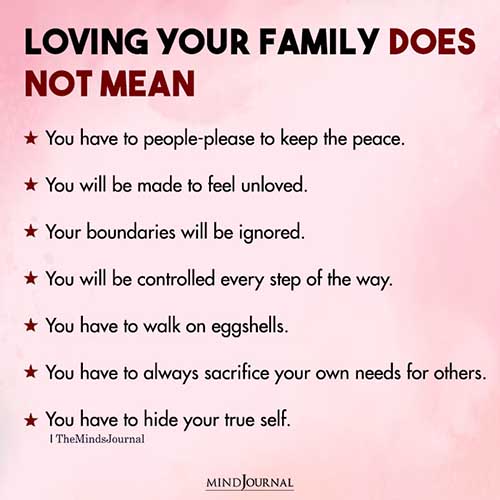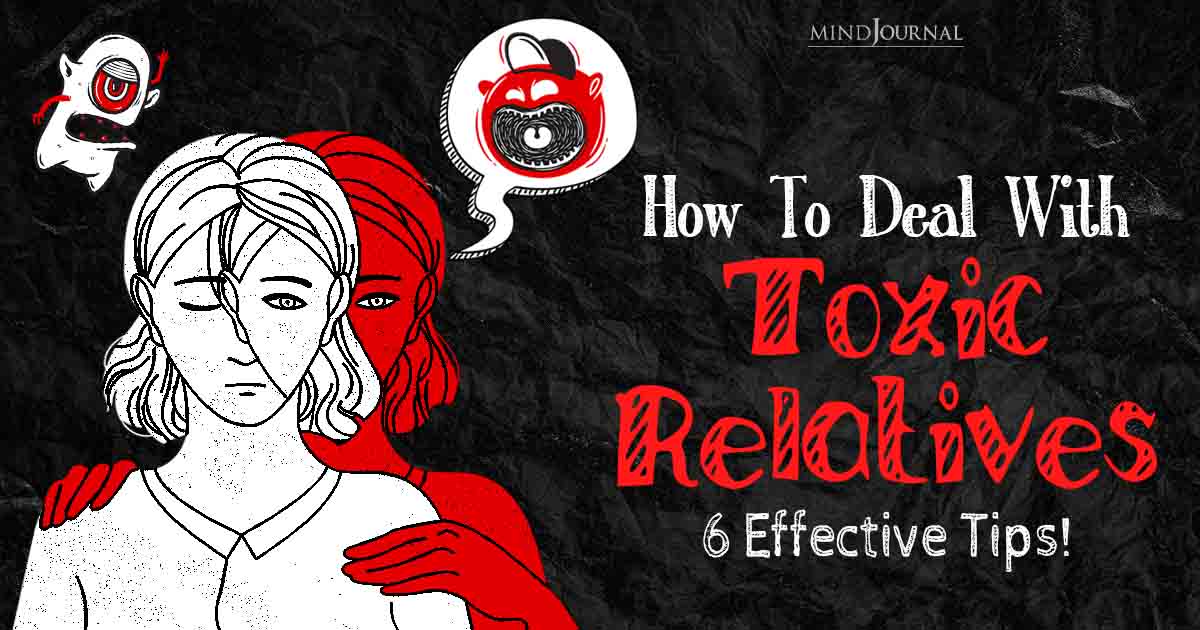In all likelihood, we will come across a few toxic people at some point in our lives: they could be coworkers or bosses; boyfriends, girlfriends or exes; friends or acquaintances; neighbors who won’t say hello – the list is endless.
However, familial relationships are special among these categories because of our shared blood.
Therefore, it can be especially hard to deal with toxic relatives since we usually feel like we’re stuck with them forever. That is why I will provide you with 5 ways on how to deal with toxic relatives.
This disorder can seem normal and feel safe going down. I’ll also give you five clear signs that you’re dealing with a toxic person! So let’s begin.
First You Need To Know The Signs of A Toxic Family
Dr. Karyl McBride defines toxic families in her book “Will I Ever Be Good Enough? Healing the Daughters of Narcissistic Mothers” as situations in which one or more family members emotionally or physically mistreat, misuse, or abuse another.
Recognizing signs of dysfunction and dangers helps us to understand and develop ways how to deal with toxic relatives.

These signs of a toxic family are important to know and go towards recovery and self-improvement.
1. Absence of Boundaries and Emotional Safety:
Toxic families have emotional instability due to vague or non-existent boundaries between family members. One might feel emotionally insecure because they cannot predict how others will react to their actions or words in the same situation.
2. Miscommunication and Unresolved Disagreements:
Poor communication skills in toxic families result in frequent misunderstandings as well as unresolved conflicts. Such talks can be unpleasant where people get defensive or even avoid sharing what they think or feel, including what they want.
3. Emotional Manipulation and Control:
In a toxic family setting, an individual may employ emotional manipulation tactics to stay dominant over others. This could involve making another person feel guilty about not believing, feeling, or behaving in certain ways through gaslighting or emotional blackmailing.
4. Blame game:
Negative energy characterizes toxic families that are always blaming, condemning, and shaming each other. Instead of being supportive environments filled with love where people can grow together by overcoming their weaknesses collectively.
Such homes create an atmosphere around individuals that makes them believe finding fault with anyone else but themselves will solve all problems. The need to learn how to deal with toxic relatives in those situations becomes crucial.
5. Constant Neglecting Emotionally & Lack Of Supportiveness
Members often end up feeling ignored or invalidated when emotional needs go unmet within these types of households. Even though somebody may be there physically – sometimes what is required for healing and thriving emotionally still lacking from the rest of the family system.
Instead, you may receive indifference and criticism – but not comfort nor acknowledgment about where you find yourself at this moment in time…
It’s hard but possible to recover from an oppressive domestic background.. That’s why it’s necessary to learn better strategies for dealing with difficult relatives at home.
Read More: 10 Subtle Signs Your Family Hates You And How To Deal With Them!
6 Ways On How To Deal With Toxic Relatives
Dealing with toxic relatives can feel like navigating through a stormy sea. It’s tough, and at times, it can leave you feeling battered and exhausted. But amidst the tumult, there are ways to find your bearings and steer toward calmer waters.

Here’s what I’ve learned about how to deal with toxic relatives:
1. Learn To Set Boundaries And Stick To Them!
I’ve realized that setting boundaries isn’t just about protecting myself but safeguarding my peace of mind. Through trial and error, I’ve discovered that boundaries are essential for maintaining a sense of self-respect and dignity in the face of toxicity.
It’s not just about saying “no” when necessary; it’s about honoring my needs and values, even when others might push against them. The ability to communicate these boundaries firmly yet compassionately is crucial when you are learning how to deal with toxic relatives.
2. You Need Time For Self-Care
Self-care has become my lifeline amidst the chaos. It’s not just about indulging in occasional treats or pampering sessions (although those are nice too!), but rather about cultivating a deep, ongoing commitment to my well-being.
Remember, learning how to deal with toxic relatives begins with how you start to love your self. I don’t mean hating or not caring about others.
I’ve realized that self-care isn’t selfish; it’s essential for maintaining resilience and inner strength. Whether it’s carving out time for meditation, immersing myself in creative pursuits, or simply allowing myself to rest when needed, prioritizing self-care has been a radical act of self-love and self-compassion.
3. Limiting Interaction Can Be Helpful:
I’ve learned that less can indeed be more when it comes to toxic relationships. Instead of trying to force connections or maintain constant contact out of a sense of obligation, I’ve discovered the power of intentional detachment.
By prioritizing quality over quantity, I’ve been able to focus my energy on nurturing relationships that bring joy and fulfillment, rather than draining my emotional reserves. It’s about choosing authenticity over superficiality, and recognizing that sometimes, less really is more.
Read More: Dealing With Estranged Family: 7 Effective Tips You Should Know!
4. Remember Seeking Support Is Not Bad!
One of the most transformative realizations on my journey has been the importance of reaching out for support. Whether it’s confiding in a trusted friend, seeking guidance from a mentor, or connecting with a therapist, having a supportive network can make all the difference.
I’ve learned that vulnerability isn’t weakness; it’s strength. I’ve discovered a profound sense of connection and belonging by allowing myself to lean on others and share my struggles. It’s a reminder that I’m not alone in this journey and that there’s strength in community and solidarity.
5. You Have To Forgive Toxic Family Members
Forgiveness has been a deeply personal and often challenging aspect of my journey. It’s not about condoning or excusing toxic behavior, but rather about releasing the heavy burden of resentment and anger that can weigh us down.
I’ve learned that forgiveness is a gift I give to myself, a radical act of self-compassion and liberation. It’s about choosing my healing and peace of mind over holding onto past hurts. While forgiveness isn’t always straightforward, I’ve discovered that it’s a journey worth embarking on, one that leads to greater freedom and inner peace.
6. Sometimes Creating Distances May Help!
Sometimes, creating distance is the most loving and compassionate choice we can make for ourselves. It’s about recognizing when a relationship or environment is toxic or unhealthy and taking steps to protect our well-being.
This might mean setting physical boundaries, such as limiting contact with certain toxic family members, or it could involve creating emotional distance by detaching from harmful dynamics.
While it’s never easy to walk away from loved ones, I’ve learned that putting my well-being first is not only necessary but also empowering. It’s a courageous act of self-love that allows me to reclaim my autonomy and dignity.
We’re all just doing the best we can with the tools and resources we have. By letting go of unrealistic expectations and embracing our inherent humanity, we create space for empathy, compassion, and growth. It’s a reminder that we’re all imperfect works in progress, worthy of love and acceptance just as we are.
Navigating relationships with toxic relatives isn’t easy, but by setting boundaries, practicing self-care, seeking support, and prioritizing your well-being, you can find your way through the storm.
Remember, you’re not alone, and you deserve to be surrounded by love, respect, and positivity.
Share your thoughts and feelings about how do you deal with your toxic family members!
Read More: How To Successfully Go No Contact With Toxic Parents? 8 Tips To Follow
Frequently Asked Questions (FAQs)
1. What is a toxic family?
A toxic family is characterized by dysfunctional patterns of interaction, communication, and behavior that consistently undermine the well-being of its members. It often involves negativity, conflict, emotional abuse, and mistreatment among family members.
2. What are the signs of a toxic family?
Signs of a toxic family include a lack of boundaries and emotional safety, communication breakdown, emotional manipulation and control, a cycle of blame and negativity, and emotional neglect. These patterns can lead to feelings of insecurity, anxiety, and isolation among family members.
3. How to deal with toxic relatives
Learning how to deal with toxic family members involves setting boundaries, limiting contact if necessary, practicing self-care, seeking support from friends or professionals, staying calm and grounded, setting realistic expectations, focusing on what you can control, detaching emotionally, practicing forgiveness, and considering professional help if needed.










Leave a Reply